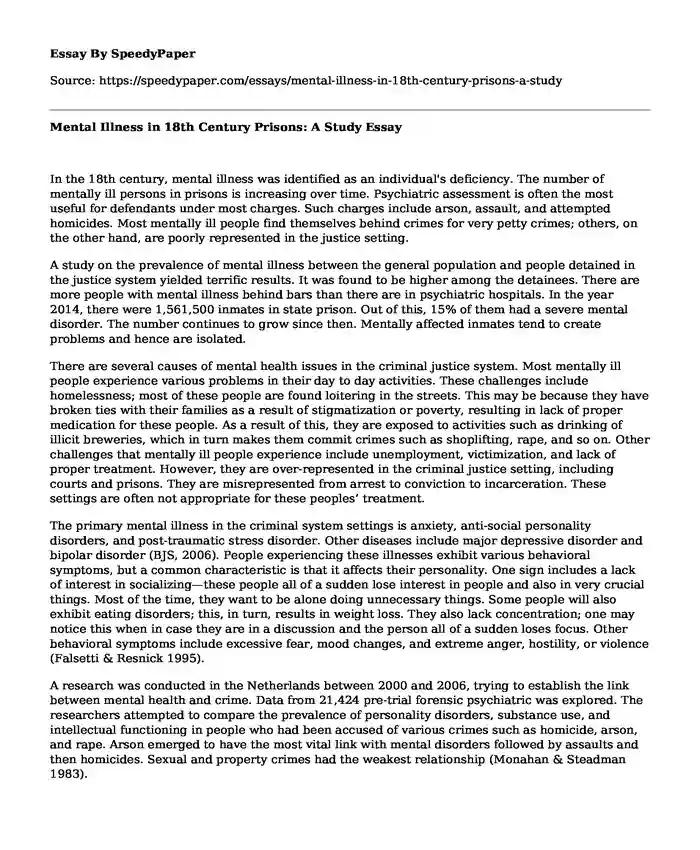
| Type of paper: | Essay |
| Categories: | History Criminal law Mental health Criminal justice |
| Pages: | 3 |
| Wordcount: | 600 words |
In the 18th century, mental illness was identified as an individual's deficiency. The number of mentally ill persons in prisons is increasing over time. Psychiatric assessment is often the most useful for defendants under most charges. Such charges include arson, assault, and attempted homicides. Most mentally ill people find themselves behind crimes for very petty crimes; others, on the other hand, are poorly represented in the justice setting.
A study on the prevalence of mental illness between the general population and people detained in the justice system yielded terrific results. It was found to be higher among the detainees. There are more people with mental illness behind bars than there are in psychiatric hospitals. In the year 2014, there were 1,561,500 inmates in state prison. Out of this, 15% of them had a severe mental disorder. The number continues to grow since then. Mentally affected inmates tend to create problems and hence are isolated.
There are several causes of mental health issues in the criminal justice system. Most mentally ill people experience various problems in their day to day activities. These challenges include homelessness; most of these people are found loitering in the streets. This may be because they have broken ties with their families as a result of stigmatization or poverty, resulting in lack of proper medication for these people. As a result of this, they are exposed to activities such as drinking of illicit breweries, which in turn makes them commit crimes such as shoplifting, rape, and so on. Other challenges that mentally ill people experience include unemployment, victimization, and lack of proper treatment. However, they are over-represented in the criminal justice setting, including courts and prisons. They are misrepresented from arrest to conviction to incarceration. These settings are often not appropriate for these peoples’ treatment.
The primary mental illness in the criminal system settings is anxiety, anti-social personality disorders, and post-traumatic stress disorder. Other diseases include major depressive disorder and bipolar disorder (BJS, 2006). People experiencing these illnesses exhibit various behavioral symptoms, but a common characteristic is that it affects their personality. One sign includes a lack of interest in socializing—these people all of a sudden lose interest in people and also in very crucial things. Most of the time, they want to be alone doing unnecessary things. Some people will also exhibit eating disorders; this, in turn, results in weight loss. They also lack concentration; one may notice this when in case they are in a discussion and the person all of a sudden loses focus. Other behavioral symptoms include excessive fear, mood changes, and extreme anger, hostility, or violence (Falsetti & Resnick 1995).
A research was conducted in the Netherlands between 2000 and 2006, trying to establish the link between mental health and crime. Data from 21,424 pre-trial forensic psychiatric was explored. The researchers attempted to compare the prevalence of personality disorders, substance use, and intellectual functioning in people who had been accused of various crimes such as homicide, arson, and rape. Arson emerged to have the most vital link with mental disorders followed by assaults and then homicides. Sexual and property crimes had the weakest relationship (Monahan & Steadman 1983).
In conclusion, the criminal justice system is playing a significant role in mentally disordered peoples’ affiliation. Research has revealed that half of the inmates are suffering from mental health. Besides, mental illness contributes significantly to crime rates.
References
Falsetti, S. A., & Resnick, H. S. (1995). Violent Crime And Mental Health. In Traumatic Stress (pp. 129-161). Springer, Boston, MA.
Monahan, J., & Steadman, H. J. (1983). Crime And Mental Disorder: An Epidemiological Approach. Crime and justice, 4, 145-189.
Cite this page
Mental Illness in 18th Century Prisons: A Study. (2023, Oct 11). Retrieved from https://speedypaper.com/essays/mental-illness-in-18th-century-prisons-a-study
Request Removal
If you are the original author of this essay and no longer wish to have it published on the SpeedyPaper website, please click below to request its removal:
- Creating Anglo-America - Free Essay in American History
- Free Essay Sample on Teen Depression and Suicide
- Literacy and Health Outcomes - Article Review Essay Example
- Essay Sample on Health Care Insurance Plan: Medicare for All
- Paper Example on Dangers of Secondhand Smoke on Infants' Health
- The Sickkids Organization - Free Essay
- Free Essay Sample. Assistive/Adaptive Technology Review
Popular categories




